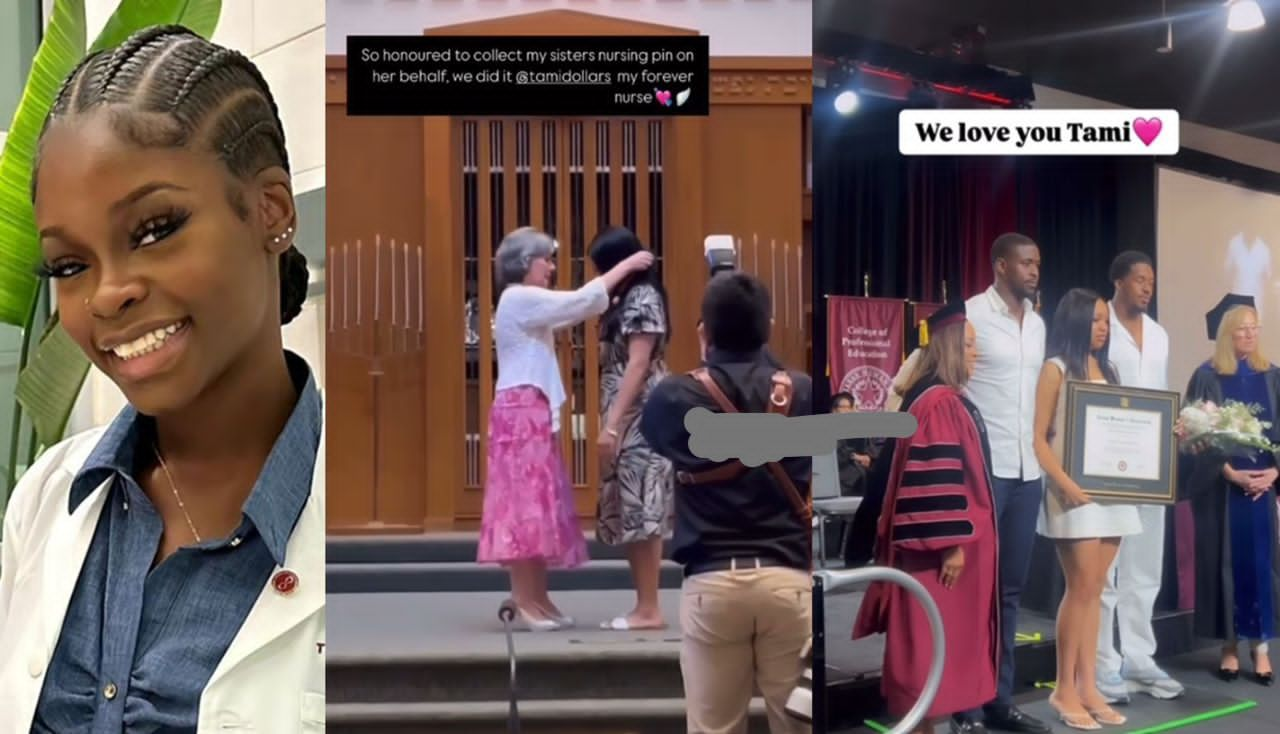
Tears in the Auditorium: Sister of Slain British-Nigerian Nurse Receives Her Graduation Award in Heart-Wrenching Moment

It was supposed to be one of the proudest days in the life of British-Nigerian nurse Tamilore Odunsi. After years of hard work, long nights of studying, and an unwavering dream to serve others through the medical profession, her graduation day had finally come. But instead of walking across the stage to accept her well-earned degree, her name was called out to a hushed, grieving auditorium — and in her place, her younger sister stepped forward with trembling hands to receive the award on her behalf. A haunting silence fell over the crowd, followed by the sound of muffled sobs and applause weighed down by sorrow.
Just one week before the graduation ceremony in Texas, 25-year-old Tamilore Odunsi was murdered, her life cut short in a senseless act of violence that has left two nations — Nigeria and the United Kingdom — grappling with the devastating loss of a young woman who had dedicated herself to healing others. What should have been a moment of celebration became a searing reminder of a bright future stolen too soon.
The emotional footage from the ceremony, now widely shared on social media, captured the exact moment Tamilore’s name echoed through the hall. Her peers stood up in solidarity, some holding back tears, as her sister slowly walked onto the stage to receive her certificate in a moment that pierced hearts across the world. Clutching the award to her chest, her sister fought to remain composed, but the visible grief and weight of the moment made it clear: this was no ordinary graduation. This was a tribute to a life that deserved to be there.
Tamilore’s story is one of ambition, kindness, and resilience. Born to Nigerian parents and raised between the UK and Nigeria, she relocated to the United States to pursue her dreams of becoming a nurse. According to her family and friends, she was passionate about public health, particularly in underserved communities, and often spoke about using her degree to advocate for mental health and women's wellness in marginalized populations. Described as soft-spoken, brilliant, and deeply empathetic, Tamilore had a way of making people feel seen and heard. Her professors recall her as one of the brightest students in the nursing program, with a natural instinct to care for others that could not be taught.
But in a cruel twist of fate, just days before her graduation, Tamilore was found dead in what authorities are now calling a domestic violence-related homicide. Investigators say she was killed in her Texas apartment, allegedly by a man she had previously been in a relationship with. The suspect has been arrested, but the investigation is ongoing. Her death has shocked and devastated not just her family and school community, but also the broader African diaspora, as many grapple with the horror of her story and the larger issue of gender-based violence that continues to claim the lives of women globally.
Her family, who traveled from overseas to attend her graduation, never imagined the occasion would be one of mourning instead of celebration. In a heartbreaking statement released after the ceremony, her parents described Tamilore as “a jewel in our family, full of compassion, promise, and purpose,” and called for justice while also urging the public to take violence against women more seriously. “No family should have to bury their daughter when she should be stepping into her destiny,” the statement read. “Tamilore had so many dreams, and they were all rooted in helping others. We are shattered beyond words.”
The school, where Tamilore was a beloved member of the nursing program, organized a tribute in her honor. Her seat at the graduation was left empty, adorned with a white rose and her academic regalia. Faculty members offered words of remembrance, while a moment of silence was observed for all victims of domestic violence. Several students wore purple ribbons — the color associated with domestic violence awareness — in solidarity with Tamilore and other women who never got the chance to tell their stories.
Across social media, the hashtag #JusticeForTamilore began to trend, with thousands of users from around the world expressing outrage, grief, and support for her grieving family. Many users shared their own stories of abuse and called for systemic change in how domestic violence is handled, particularly in cases involving immigrants and women of color. Some posted Tamilore’s photos, celebrating her achievements and condemning the cruelty that cut her life short.
Advocacy groups in the U.S., UK, and Nigeria have seized on Tamilore’s story as a call to action. Petitions demanding tougher penalties for domestic abuse, better protective services for women, and more mental health support for survivors have gained traction in the wake of her death. Her murder, while tragic, has become a rallying cry for those fighting to ensure that other women do not meet the same fate.
In Nigeria, her extended family held a candlelight vigil, where mourners lit candles and prayed for her soul. In the UK, former classmates gathered to honor her memory, many of them visibly emotional as they spoke about the vibrant, compassionate friend they had known. “Tamilore was the kind of person who would always check on you,” said one classmate. “She deserved to walk across that stage. She deserved to live her dream.”
As the ceremony came to a close and families took pictures with graduates, there was a sense of heaviness in the air. For Tamilore’s family, the pain of seeing her name on the graduation list, knowing she would never be there to smile for the camera or hold her certificate, was indescribable. But in that moment — when her sister took the stage and the entire auditorium rose to honor her — Tamilore was present. Not just in name, but in the hearts of everyone who knew her story.
The memory of Tamilore Odunsi now lives on as more than just a student who didn’t get to graduate. She has become a symbol — of promise unfulfilled, of voices that must be heard, and of a society that must do better to protect its women. Her light was dimmed far too soon, but her story will not be forgotten.
As the world mourns her passing, there is a collective hope that justice will prevail, and that her tragic end will lead to real change — so that no sister will have to walk across a stage in tears, holding a certificate that should have been received with joy, not grief.


